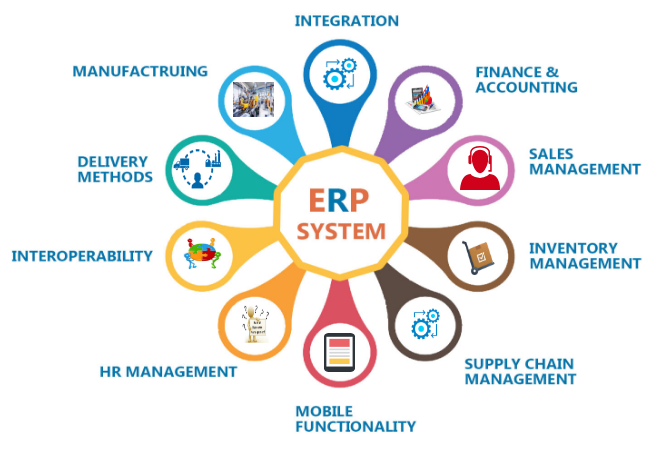What is ERP Software?
ERP software, or enterprise resource planning software, is a suite of integrated applications that helps businesses manage their core processes, such as accounting, manufacturing, sales, and customer service. ERP software can help businesses improve efficiency, reduce costs, and make better decisions.
ERP software is a centralized system that stores and manages data from all of a company’s departments. This data is then shared across the company, which allows employees to access the information they need to do their jobs more effectively.
ERP software can be used to automate many of a company’s manual processes, such as order processing, inventory management, and customer service. This can free up employees to focus on more strategic tasks, such as developing new products or services.
ERP software can also help businesses save money by eliminating duplicate data entry, improving inventory management, and reducing waste.
How Can ERP Software Benefit Your Business?
ERP software can benefit businesses in a number of ways, including:
- Improved efficiency: ERP software can help businesses automate many of their manual processes, which can free up employees to focus on more strategic tasks.
- Reduced costs: ERP software can help businesses save money by eliminating duplicate data entry, improving inventory management, and reducing waste.
- Better decision-making: ERP software can provide businesses with real-time data and insights that can help them make better decisions about everything from product pricing to marketing campaigns.
- Increased visibility: ERP software can provide businesses with a single view of their operations, which can help them identify areas of improvement and make better decisions.
- Improved compliance: ERP software can help businesses comply with regulations, such as those related to financial reporting and customer privacy.
- Increased agility: ERP software can help businesses respond quickly to changes in the market, such as new customer demands or changes in regulations.
Types of ERP Software
There are two main types of ERP software: on-premise and cloud-based. On-premise ERP software is installed and hosted on a company’s own servers. Cloud-based ERP software is hosted on a third-party provider’s servers and accessed over the Internet.
On-premise ERP software is typically more expensive than cloud-based ERP software, but it gives businesses more control over their data and security. Cloud-based ERP software is more affordable and easier to implement, but businesses have less control over their data and security.
Choosing the Right ERP Software
When choosing ERP software, there are a number of factors to consider, including:
- The size and complexity of your business
- Your industry
- Your budget
- Your specific needs
It is important to choose an ERP software that is right for your business. A poorly chosen ERP system can be a major headache and a waste of money.
How to Implement ERP Software
Implementing ERP software can be a complex and time-consuming process. It is important to have a plan in place and to involve all stakeholders in the process.
The first step is to assess your current needs and identify the areas where ERP software can help you improve. Once you have a clear understanding of your needs, you can start to evaluate different ERP solutions.
Once you have chosen an ERP solution, you need to develop a plan for implementation. This plan should include a timeline, a budget, and a list of tasks that need to be completed.
The implementation process will vary depending on the size and complexity of your business. However, there are some general steps that all businesses need to take, such as:
- Training employees on how to use the new system
- Converting data to the new system
- Testing the new system
- Go-live
Conclusion
ERP software can be a valuable tool for businesses of all sizes. However, it is important to choose the right ERP software and implement it properly. By following the tips in this blog post, you can ensure that your ERP implementation is a success.
Here are some additional benefits of ERP software:
- Increased customer satisfaction: ERP software can help businesses provide better customer service by providing employees with access to real-time customer data.
- Improved employee morale: ERP software can help improve employee morale by automating many of the tasks that employees find tedious and repetitive.
- Increased productivity: ERP software can help businesses increase productivity by automating many of the manual processes that employees currently perform.
- Reduced risk: ERP software can help businesses reduce risk by providing them with a single source of truth for their data.
If you are considering implementing ERP software, I encourage you to contact us for a free consultation. We would be happy to discuss your specific needs and help you find the right ERP solution for your business.





Comments